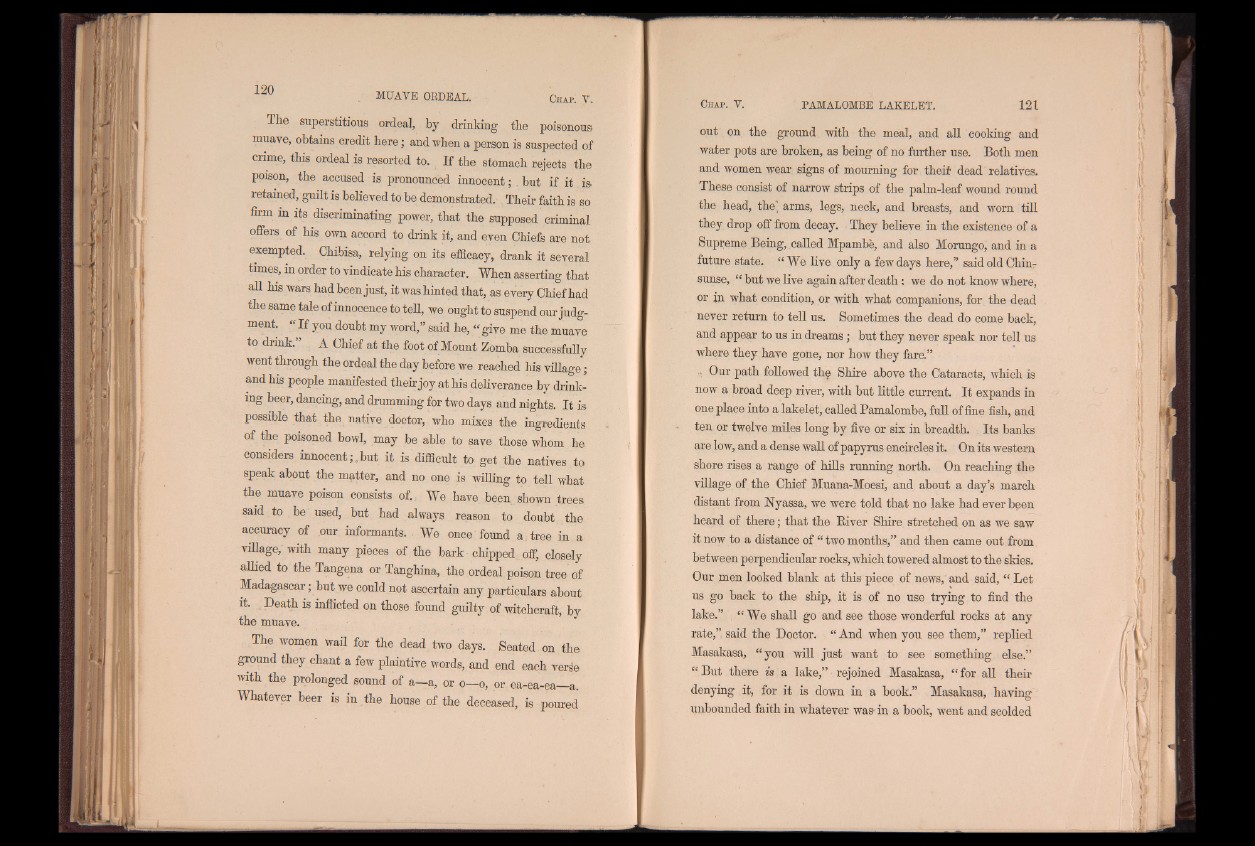
The superstitious ordeal, by drinking the poisonous
muave, obtains credit bere; and when a person is suspected of
crime, this ordeal is resorted to. If the stomach rejects the
poison, the accused is pronounced innocent; but if it is
retained, guilt is believed to be demonstrated. Their faith is so
firm in its discriminating power, that the supposed criminal
offers of his own accord to drink it, and even Chiefs are not
exempted. Chibisa, relying on its efficacy, drank it several
times, in order to vindicate his character. When asserting that
all his wars had been just, it was hinted that, as every Chief had
the same tale of innocence to tell, we ought to suspend our judgment.
« If you doubt my word,” said he, “ give me the muave
to drink.” A Chief at the foot of Mount Zomba successfully
went through the ordeal the day before we reached his village;
and his people manifested their joy at his deliverance by drinking
beer, dancing, and drumming for two days and nights. I t is
possible that the native doctor, who mixes the ingredients
of the poisoned bowl, may be able to save those whom he
considers innocent;,but it is difficult to get the natives to
speak about the matter, and no one is willing to tell what
the muave poison consists of. We have been shown trees
said to be used, but had always reason to doubt the
accuracy of .our informants. We once found a tree in a
village, with many pieces of the bark chipped off, closely
allied to the Tangena or Tanghina, the ordeal poison tree of
Madagascar; but we could not ascertain any particulars about
it. Death is inflicted on those found guilty of witchcraft, by
the muave.
The women wail for the dead two days. Seated on the
ground they chant a few plaintive words, and end each verfe
with the prolonged sound of a—a, or o—o, or ea-ea-ea—a.
Whatever beer is in the house of the deceased, is poured
out on the ground with the meal, and all cooking and
water pots are broken, as being of no further use. Both men
and women wear signs of mourning for theif dead relatives.
These consist of narrow strips of the palm-leaf wound round
the head, the' arms, legs, neck, and breasts, and worn till
they drop off from decay. They believe in the existence of a
Supreme Being, called Mpambe, and also Morungo, and in a
future state. “We live only a few days here,” said old Chin-
sunse, “ but we live again after death; we do not know where,
or in what condition, or with what companions, for the dead
never return to tell us. Sometimes the dead do come back,
and appear to us in dreams; but they never speak nor tell us
where they have gone, nor how they fare.”
■ Our path followed the Shire above the Cataracts, which is
now a broad deep river, with but little current. I t expands in
one place into a lakelet, called Pamalombe, full of fine fish, and
ten or twelve miles long by five or six in breadth. Its banks
are low, and a dense wall of papyrus encircles it. On its western
shore rises a range of hills running north. On reaching the
village of the Chief Muana-Moesi, and about a day’s march
distant from Nyassa, we were told that no lake had ever been
heard of there; that the River Shire stretched on as we saw
it now to a distance of “ two months,” and then came out from
between perpendicular rocks, which towered almost to the skies.
Our men looked blank at this piece of news, and said, “ Let
us go back to the ship, it is of no use trying to find the
lake.” “ We shall go and see those wonderful rocks at any
rate,” said the Doctor. “ And when you see them,” replied
Masakasa, “ you will just want to see something else.”
“ But there is a lake,” rejoined Masakasa, “ for all their
denying it, for it is down in a book.” Masakasa,7 havinOg
unbounded faith in whatever was- in a book, went and scolded